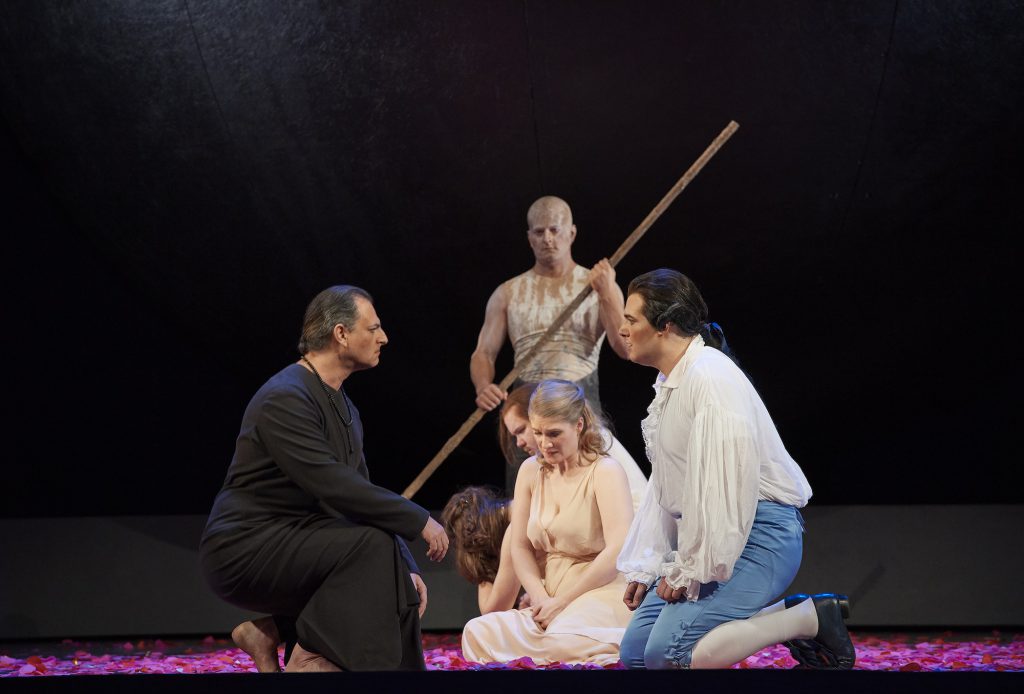Fast forward to the past, story folded into backstory related as portent of the future. If the timespan is confusing in director Wajdi Mouawad’s retelling of Mozart’s antic comedy, Die Entführung aus dem Serail (The Abduction from the Seraglio), the acting out of reminted narrative values is dumbfounding. The Montreal-based Lebanese-Canadian dramaturge has single-handedly dismantled a much loved frothy period piece, hastily composed by the peripatetic wunderkind from Salzburg for Vienna’s lowbrow Nationalsingspiel in 1781, artlessly reshaping it into a clumsy assault on contemporary bigotry and Islamaphobia. The resulting iteration, a joint undertaking by the Canadian Opera Company and Opéra de Lyon, is a shambles, ponderous and self-indulgent. Auteurism substitutes for imagination.
Rewriting the bulk of the opera’s admittedly naive, fairytale-like libretto in German as originally penned, conferring not a shred of legitimacy to his lifeless adaptation in the process, Mouawad begins at the end of what was formerly a breezy, slapstick romance.
Returning heroes, noble-born Belmonte and bumbling servant Pedrillo, in the company of their well-travelled true loves, Konstanze and Blonde, all having arrived home safely after crossing paths with an imperious sultan in the Near East, are celebrated as Söhne und Töchter der Aufklärung (“sons and daughters of the Enlightenment”) by a jubilant gathering of aristocrats. A lively game known to the revellers as Tête de turc follows, hammers ringing as cheering players beat a turbaned bust. The messaging comes early in this reinvented Abduction, blatant and heavy-handed, continuing for over three dreary hours without pause.
Bassa Selim, played in later scenes by the same performer, actor Raphael Weinstock, who appears as Belmonte’s exultant father at curtain rise — more inexplicably symbolic than cost-effective casting, surely — is portrayed as a wise, beneficent ruler, every bit as civilized as any Western potentate. Witness the girls’ school that flourishes in his palace. But the Sultan is also an inveterate collector of women, his wives glimpsed voyeuristically in a giant, see-through globe, a spinning world of wispy sensuality encircled by bands of captivity.
Paradox abounds in Mouawad’s production, more annoying than dramatically enriching.
Konstanze and Blonde — hair-colour counter-intuitively assigned — berate Belmonte and Pedrillo for their blind prejudice and hatred. Selim and burly Osmin, overseer of the Pasha’s harem, are not, they insist, barbarians. Blonde, in fact, is carrying Osmin’s child. There is more than a vague, unspoken suggestion of Stockholm Syndrome at play here, an outpouring of empathy on the part of hostages for their captors. Yet both women still crave freedom. Attitudes to normalcy still collide. Curiously — and decidedly implausibly — abduction and imprisonment is never emphatically condemned by the pair after their release.
Mouawad would have us see this central theatrical contradiction as irony, Eastern absolutism is no worse than Western chauvinism. But the layering of invention wears the notion thin. Writing and direction turn on a dime, driven not so much by a coherent endgame — scenes that satisfy or at least provoke reflection — but rather by a sense of ad hoc. Events occur, speeches arise, not by design but rather by the need to move the action forward. Things happen because the director wishes them to happen.
Osmin blusters and pontificates. A little child listening at his feet kisses him tenderly on the cheek. Time after time, Mouawad bulldozes a dead end path through his own material.
The gracelessness of this Abduction overwhelms, mirrored to hugely irritating effect by a stunningly ugly set. A pair of monolithic grey slabs manipulated by deliberately visible stagehands squeeze and crush a cramped playing area —walls laughably made to literally close in. An immense crude hemisphere — the seraglio, as will later be revealed — looms out of the shadows. Gone is any sense of Abduction’s inherent exoticism. Brutalism is the order of the night, dulling the senses, anaesthetizing the desire for involvement.
Singing and playing, mercifully almost free from tampering, are not enough to redeem directorial heedlessness. Even here there are problems.
Jane Archibald’s brash, no nonsense Konstanze peaks dangerously high on the strident soprano meter, arguably more Queen of the Night than estranged heroine.
Tenor Mauro Peter wields a somewhat monochromatic instrument, disappointingly muted at times. Mozart is not Verdi but his music, rarified and refined, nevertheless demands vivid colouring. Peter lacks abiding lustre.
Credit due, Claire de Sévigné sings an engaging Blonde. Bass Goran Juric is a robust Osmin. Owen McCausland is a suitably buffoonish Pedrillo.
The Canadian Opera Company Orchestra under the watchful guidance of music director Johannes Debus is consistently, thankfully solid though, once again, director Mouawad does his utmost to derail the proceedings. Mozart’s delightful, upbeat overture with its irresistible 18th century evocation of imagined Janissary marching bands is carved into multiple fragmented movements interspersed with gratuitous talk.
There is no magic to this Abduction from the Seraglio, no transformative power, no encouragement to surrender the self. The will to watch and listen is steadily eroded and with it, ultimately, any satisfaction to be had from discussing this hopefully forgettable experience.
* * *
Raphael Weinstock as Bassa Selim, Jane Archibald as Konstanze, Mauro Peter as Belmonte, Claire de Sévigné as Blonde, Owen McCausland as Pedrillo. Photo by Michael Cooper.


